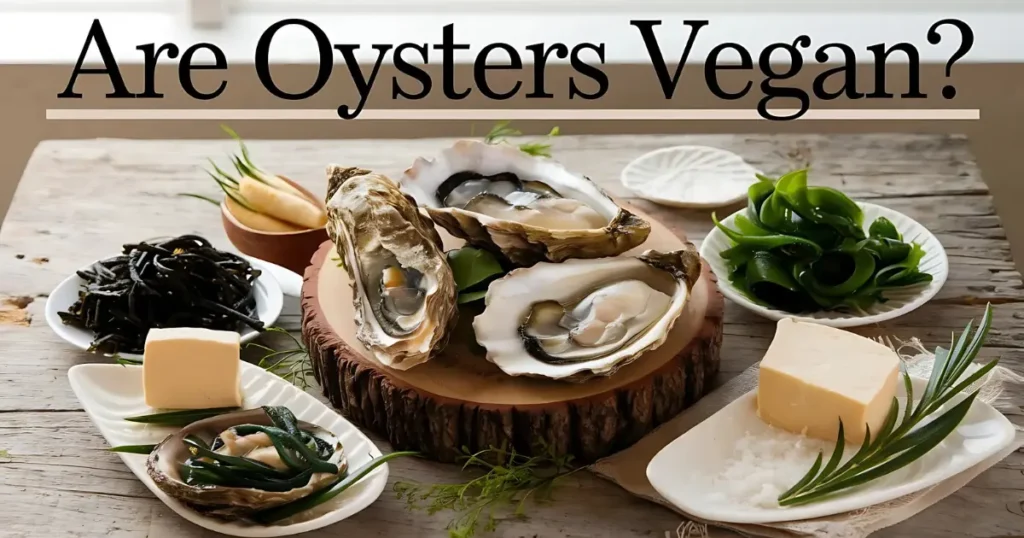ItImagine sitting at a dinner table, committed to a plant-based lifestyle, and someone serving oysters. A dilemma arises: should you eat them? Oysters are often praised for their environmental benefits, and they lack a central nervous system, so do they really belong in the same category as other animal products? The question Are oysters vegan? The answer is no, oysters are generally not considered vegan because they are animals. However, some who follow plant-based diets make an exception for them. The reasoning behind this is that oysters do not have a brain or central nervous system, which suggests they do not experience pain like other animals. This has sparked debate within the vegan community.
What Are Oysters and Bivalves?
Oysters are a type of bivalve mollusk, part of a group that also includes mussels and clams. These creatures live in the water and play a vital role in the marine ecosystem. Oysters are filter feeders, meaning they help clean the water by removing pollutants, making them essential for improving water quality. Unlike many animals raised for food, they require no additional feed, which makes them more sustainable. Due to their environmental role, oysters are sometimes considered a “green” food option.
The Ethical Debate: Sentience and Pain
One of the core principles of veganism is to avoid causing harm to animals. The debate about whether oysters feel pain or not centers on their lack of a central nervous system. Because of this, many believe that oysters cannot feel pain, unlike mammals or birds. This has led to a divide among vegans: some argue that eating oysters is ethically acceptable since they do not suffer, while others stick to the belief that any animal product is off-limits, regardless of its ability to feel pain.
On one side of the argument, supporters of “ostro veganism” believe that since oysters cannot experience pain, eating them does not violate vegan ethics. On the other hand, traditional vegans argue that veganism is about avoiding the exploitation of all animals, sentient or not. Therefore, even if oysters don’t feel pain, they are still animals and should be avoided.
Health and Nutritional Value
Oysters are not just sustainable—they are also nutrient-dense. They provide a rich source of vitamins and minerals that can be hard to obtain from a strictly plant-based diet. For example, oysters are packed with protein, Omega-3 fatty acids, vitamin B12, zinc, and iron. These nutrients are often a concern for vegans, as plant-based sources are sometimes limited. For instance, vitamin B12 is mostly found in animal products, so including oysters could be one way to avoid the need for supplements.
While oysters do provide significant nutritional benefits, it’s important to note that these same nutrients can be found in plant-based foods or supplements. Omega-3s can be sourced from flaxseeds and chia seeds, while iron and zinc are abundant in legumes and fortified foods. So, while oysters are nutrient-rich, they are not essential for maintaining a healthy vegan diet.
The Vegan Dilemma: Should Oysters Be Considered Vegan?
The decision to eat oysters ultimately depends on where one stands in the ethical and environmental debate. For some, the idea of consuming an animal, regardless of its ability to feel pain, goes against their vegan principles. Others take a more flexible approach, considering oysters a unique case due to their lack of sentience and positive environmental impact.
For those who choose to include oysters in their diet, the concept of “ostroveganism” has emerged. This subset of veganism allows for the consumption of bivalves like oysters and mussels, based on the argument that they do not feel pain and their farming benefits the environment.
However, many in the vegan community disagree with this approach. Groups like PETA maintain that all animal products, regardless of the circumstances, should be avoided. The debate remains ongoing, with no definitive answer.
Vegan Alternatives to Oysters
For vegans seeking alternatives to oysters, there are a variety of plant-based options that can mimic both the texture and flavor of oysters. Here are some popular choices:
1. Oyster Mushrooms
Oyster mushrooms are the most common and effective substitute due to their texture, which is similar to that of cooked oysters. They absorb flavors well and can be used in recipes like vegan oyster stew or fried oyster mushrooms. With their mild umami taste, they can offer a similar savory experience.
2. Seaweed
Seaweed, especially kelp or dulse, is often used to replicate the briny, salty flavor of seafood. When combined with mushrooms or tofu, seaweed can add that ocean-like taste. It’s particularly useful in soups or chowders to give a marine-inspired flavor without using oysters.
3. Hearts of Palm
Hearts of palm are a versatile ingredient often used to replace seafood in plant-based dishes. When cut into rounds or marinated, they can replicate the chewy, tender texture of oysters. Their neutral taste allows for easy seasoning, and they work well in vegan “seafood” salads or vegan oyster-style dishes.
4. King Oyster Mushrooms
Slightly different from regular oyster mushrooms, king oyster mushrooms have a thick, meaty texture that resembles the body of an oyster. Slicing them into rounds and cooking them in a flavorful broth or batter can create a satisfying vegan oyster alternative.
5. Tofu
Tofu, especially silken or medium-firm varieties, can take on the soft texture of oysters when prepared properly. It works well when marinated with seaweed or other ocean-like seasonings to bring out a seafood flavor. It can be used in dishes like vegan oyster po’ boys or stir-fries.
6. Eggplant
Thinly sliced and properly seasoned eggplant can mimic the texture of fried oysters. It has a tender, yet slightly chewy texture, and when battered and fried, it offers a satisfying alternative in dishes like vegan “fried oysters” or seafood platters.
The question of whether oysters are vegan does not have a simple answer. While they do not seem to feel pain and offer significant environmental and nutritional benefits, they are still animals, and consuming them goes against the traditional definition of veganism. Ultimately, the decision is a personal one, depending on how individuals interpret the principles of veganism in terms of ethics, health, and sustainability. Whether one chooses to include oysters in their diet or not, the debate highlights the complexities of ethical eating and the importance of informed choices.




